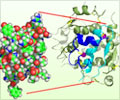Research now shows that diabetes in dogs could be cured with a single gene therapy, thus broadening the horizon for the therapy in humans!

Diabetes is a metabolic disease, which can be classified as Type 1 (lack of insulin production) or Type II (impaired insulin production along with an inadequate response to the hormone). Type 1 diabetes is commonly seen in dogs, wherein the pancreas is incapable of secreting adequate levels of insulin.
Generally upon consumption of a meal by a dog, the food is broken down into various components, including glucose, which is carried into the cells by insulin. When insulin is not produced or utilized normally, it causes elevation of blood sugar levels or ‘hyperglycemia’, which, if left untreated, can cause many complicated health problems for the dog.
Insulin-dependent diabetes in dogs was thought of as a life-long disease, but recently researchers from the Universitat Autònoma de Barcelona (UAB), led by Fàtima Bosch, have shown for the very first time that it is possible to cure diabetes in large animals with a single session of gene therapy.
This study which was published in the journal Diabetes, showed that the dogs recovered their health and no longer showed symptoms of diabetes after a single gene therapy session. In some cases, the dogs appeared to be completely cured, and they did not have recurrence of diabetes even after four years. The success of this study in large animals has opened up new avenues and has ushered in new hope for a cure in human diabetic patients.
The head researcher, Fàtima Bosch points out, "this study is the first to demonstrate a long-term cure for diabetes in a large animal model using gene therapy."
Out of the two injected genes, one gene produces insulin, and the other makes glucokinase which regulates the amount of insulin produced based on the level of sugar in the blood, which in turn reduces diabetic hyperglycemia.
Previously, the same group of researchers had shown that a similar treatment was effective in mice, but the current study not only demonstrated long term control of diabetes, but also proved that the diabetic dogs were able to maintain normoglycemia and normal levels of glycosylated proteins with no secondary complications even after 4 years with the disease.
The researchers said that more studies on animals will be needed to gather stronger evidence before this experimental treatment is ready to be tested in humans. However, the current study opens up promising new avenues which may pave way to give us a completely new type of treatment of diabetes in humans in the near future.
Source-Medindia















